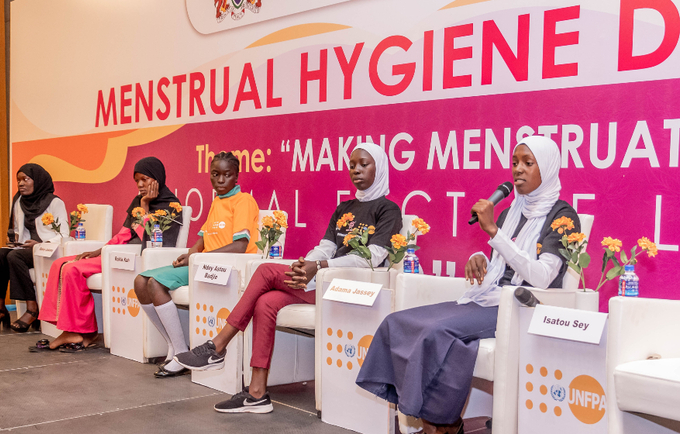Period poverty, which refers to the inability to afford menstrual products, is a significant issue, particularly in developing countries. Menstruating girls and women face this challenge every month, and it is highlighted on Menstrual Hygiene Day, observed annually on May 28th.
Ms. Fatty, who operates a machine to install snaps on reusable pads, expresses her happiness in working with others and finding joy in her work. The durable pads she produces benefit women with mobility impairments who struggle to access restroom facilities. Despite the challenges posed by her disabilities, joining the project has improved Ms. Fatty’s life, and she hopes to continue working there.

In The Gambia, period poverty is prevalent across the country, with rural areas being particularly affected. The lack of menstrual products and sanitary facilities leads some girls to miss approximately five days of school each month. Fear of staining their clothes and becoming targets of bullying or abuse contributes to gender inequality, as boys attend school more regularly, while girls are more likely to drop out.
To address this issue, the UN Population Fund (UNFPA) initiated a project in Basse, in The Gambia’s Upper River Region, to produce recyclable sanitary pads. These pads are distributed in schools and hospitals within local communities. The project also provides an opportunity to discuss bodily autonomy, sexual and reproductive health, and mitigate period shaming and stigma.
Moreover, the project empowers young women in the community by offering them secure employment and the chance to acquire new skills.

Menstrual Hygiene Day, observed on May 28th, aims to promote good menstrual health and hygiene worldwide. Poor menstrual health and hygiene undermine fundamental rights, including the right to work and education for women, girls, and menstruating individuals. It also exacerbates social and economic inequalities, reinforces exclusion and shame, and diminishes human dignity. Gender inequality, extreme poverty, humanitarian crises, and harmful traditions amplify deprivation and stigma.
The theme for this year’s Menstrual Hygiene Day is “Making menstruation a normal fact of life by 2030.” The UNFPA Executive-Director, Natalia Kanem, emphasizes the importance of a girl’s first period being a happy milestone, allowing her to understand and care for her body, attend school without stigma or shame, and have access to necessary resources.
Menstrual Hygiene Day brings together governments, non-profits, the private sector, and individuals to promote good menstrual health and hygiene worldwide. Its objectives include breaking the silence, raising awareness about menstrual issues, and urging decision-makers to take action for better menstrual health and hygiene.
UNFPA employs four broad approaches to promote and improve menstrual health globally:
- Supplies and safe bathrooms: Distribution of dignity kits containing pads, soap, and underwear in humanitarian emergencies, as well as improving safety in displacement camps by providing flashlights and installing solar lights in bathing areas. Projects also focus on teaching girls to make reusable menstrual pads or raising awareness about menstrual cups.
- Improving education and information: Through youth programs and comprehensive sexuality education, UNFPA helps both boys and girls understand that menstruation is a healthy and normal process.
- Supporting national health systems: Efforts include promoting menstrual health, providing treatment for menstrual disorders, and procuring reproductive health commodities to address menstruation-related issues.
- Gathering data and evidence: UNFPA-supported surveys shed light on girls’ and women’s knowledge about their menstrual cycles, health, and access to sanitation facilities, contributing to a better understanding of menstrual health and its connection to global development.






